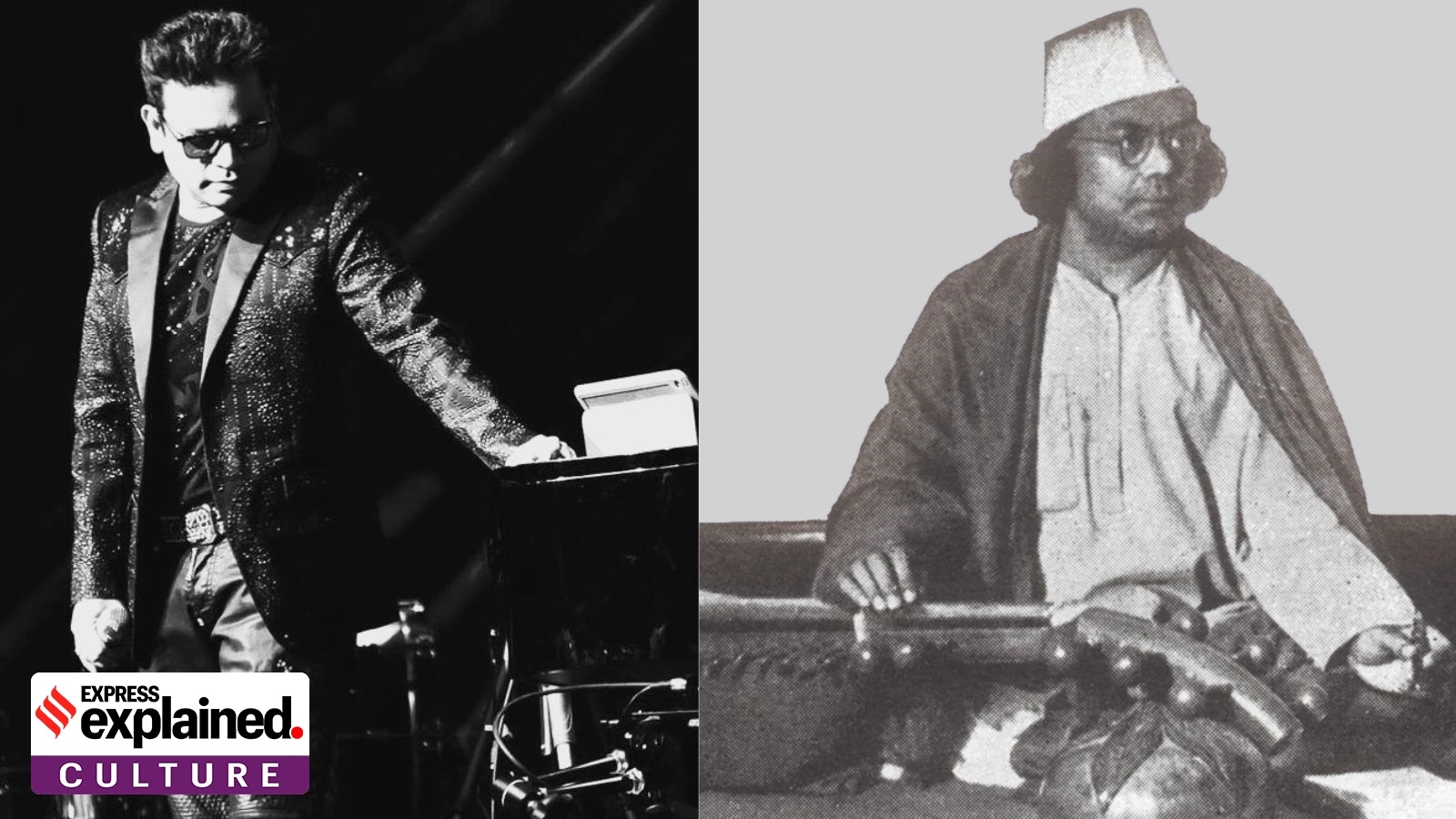Why a Rahman song from Pippa has offended many in Bengal
The Oscar-winning composer has adapted Karar Oi Louho Kopat, a rousing patriotic anthem by the revolutionary poet Kazi Nazrul Islam, that many believe makes it sound folksy and romantic
 AR Rahman (left) and Bengali poet Kazi Nazrul Islam (right). (Credit: X/@arrahman and Wikimedia Commons)
AR Rahman (left) and Bengali poet Kazi Nazrul Islam (right). (Credit: X/@arrahman and Wikimedia Commons) Roy Kapur Films, the maker of a new Hindi-language film called Pippa, has apologised for any “unintended distress” that a song in the film, Karar Oi Louho Kopat, has caused. The song, written and composed by the Bengali poet Kazi Nazrul Islam in 1922 as a rousing nationalist anthem against the British Raj, has been set to a new tune by A R Rahman for Pippa, which has been widely criticised in both West Bengal and Bangladesh.
The film, directed by Raja Krishna Menon, and starring Ishaan Khatter and Mrunal Thakur, tells the story of Capt (later Brig) Balram Singh Mehta, hero of the crucial tank battle of Garibpur, west of Dhaka, during the 1971 war with Pakistan. It premiered on Amazon Prime Video on November 10.
What have the film’s makers said?
The ‘Statement from the Team of Pippa’ posted on Instagram and X, clarifies that the “rendition of the song is a sincere artistic interpretation, embarked upon only after securing the necessary adaptation rights from the estate of the Late Mr Kazi Nazrul Islam”.
The statement records the filmmakers’ “deep respect for the original composition”, acknowledges the “emotional attachment that audiences may have” to it, and says that “if our interpretation has hurt sentiments or caused unintended distress, we offer our sincere apologies”.
Statement from the team of Pippa. pic.twitter.com/ngZGl4taj7
— Roy Kapur Films (@roykapurfilms) November 13, 2023
So what is the song Karar Oi Louho Kopat about?
Karar Oi Louho Kopat was published in 1922 in the magazine Banglar Katha (Stories of Bengal), and was later included in Nazrul’s book Bhangar Gaan (Songs of Breaking Free). Nazrul wrote the song of revolution after the British threw Deshbandhu Chittaranjan Das (1870-1925) in prison in 1922.
The refrain of the song is Karar Oi Louho Kopat/ Bhenge Phel Kor re Lopat, which translates to Break down those iron gates of prison, make them disappear. The song was first recorded in June 1949, sung by the folk singer Girin Chakraborty.
And who was Kazi Nazrul Islam?
Nazrul (1899-1976) was a Bengali poet, writer, and musician whose oeuvre, Nazrulgeeti (Songs of Nazrul), constitutes a musical genre that is perhaps second in popularity to only Rabindrasangeet, the compositions of Rabindranath Tagore. He enjoys iconic status in West Bengal, Bangladesh, and the Bengali diaspora around the world, and is revered as the national poet of Bangladesh.
Nazrul is known as the Bidrohi Kobi (Rebel Poet) because most of the more than 4,000 songs that he wrote and composed are songs of protest and revolution, which inspired the freedom fighters of Bengal in their struggle against colonialism and imperialism. In 1923, the British arrested Nazrul because of the strongly anti-British content of a magazine that he founded and edited.
What is the problem with Rahman’s rendition of Nazrul’s song?
The song in Pippa uses Nazrul’s lyrics but with a tune that is different from Nazrul’s iconic original version. This has offended many Bengalis who have reservations about alterations or improvisations in Rabindrasangeet or Nazrulgeeti, which are seen as part of Bengal’s cherished cultural heritage and identity.
Many have described Rahman’s version of the song as a light-hearted, folksy, romantic number, very different from Nazrul’s rousing song of protest that was infused with intense patriotic fervour. Besides the rhythm and tune, Rahman has also changed the overall listening experience by introducing sounds of the flute and string instruments.
Painter Kazi Anirban, Nazrul’s grandson, told reporters that his mother did give her consent to the makers of Pippa to use the song, but not to change the tune. “The way the song has been composed with the change in rhythm and tune, is shocking. This is not the song that Nazrul Islam composed. I don’t want our family’s name in the film’s credits,” he said.
Nazrul’s granddaughter Anindita Kazi said: “As members of his (Nazrul’s) family and lovers of his creations, we cannot accept this distortion. The song must be omitted from the film.”
Anirban’s mother, Kazi Kalyani, had given her consent for the use of the song in the film in 2021, months before she passed away. In their statement, Roy Kapur Films said the filmmakers had “faithfully followed both the letter and the spirit of the license agreement for the lyrics, as duly signed with Late Mrs Kalyani Kazi and witnessed by Mr Anirban Kazi”.
“…Our agreeement”, the statement said, “permitted us to use the lyrics with a new composition”.
Who specifically is protesting against the Pippa song?
Bangladeshi writer Taslima Nasrin wrote on X, “A R Rahman changed the music of Bengali legendary poet, lyricist, composer Kazi Nazrul Islam’s famous 1921’s anti-British song ‘Karar Oi Lauho kapat’. Bengalis are furious. They demand for stopping Rahman’s remake and keeping the original music of the song.”
A R Rahman changed the music of Bengali legendary poet, lyricist, composer Kazi Nazrul Islam’s famous 1921’s anti-British song ‘Karar Oi Lauho kapat’. Bengalis are furious. They demand for stopping Rahman’s remake and keeping the original music of the song.
— taslima nasreen (@taslimanasreen) November 11, 2023
Hindustani classical vocalist Pandit Ajoy Chakrabarty said: “I did not like it (Rahman’s version). This is not expected from an eminent composer like him. This song bears a certain emotion for the Bengalis. A lot of research was required before working on this project.”
Bengali singer Raghab Chatterjee attacked the Oscar-winning composer on social media. “Mr A R Rahman, India’s most eminent music director has just released a song called Karar Oi Louho Kapat from the film Pippa. The most deplorable fact is that the song is not his exclusive property,” he posted.
“Being a Bangali we have grown up listening to the epic song Karar Oi Louho Kopat by none other than Kaji Najrul Islam. As a singer from Bengal I am not at all accepting the way Mr Rahman has tampered with the original tune and claims to be the composer of the song itself,” Chatterjee said.
Veteran Bengali singer Haimanti Shukla expressed dismay at Rahman’s improvisations. “He has no real understanding of Bengali music. This is clear from this recent controversy,” she said.
Composer Debojyoti Mishra said, “We are all familiar with A R Rahman as a genius composer. Personally, he is a good friend of mine. However, it’s distressing to discover that the iconic song of the legendary rebel poet and composer, Kazi Nazrul Islam, has been made this way. Like many others, I’m deeply shocked by this tragedy.”
- 01
- 02
- 03
- 04
- 05






































